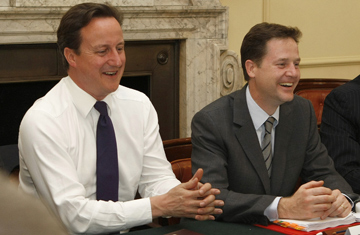
British Prime Minister David Cameron, left, and Deputy Prime Minister Nick Clegg
Tell most British voters that they have a radical new government determined to transform society and the state and the most likely response will be, "We'll see." They have, of course, been here before — after former Prime Minister Tony Blair came to power in a landslide victory in 1997, he spoke of his party, dubbed New Labour, as bringing in a "new dawn" and a "new era of politics," promises that many think never materialized.
But if Prime Minister David Cameron's Conservative–Liberal Democrat coalition manages to achieve only half the reforms it has pledged in its first 100 days, it will have gone a long way toward fulfilling that optimistic message. Since the coalition was formed, on May 11, Cameron has mapped out a program of reforms under the banner of "the Big Society" that will, for good or ill, fundamentally alter the relationship between the state of Britain and its citizens, with swaths of power and responsibility handed down from the center to the people. And all that while also pledging to cut between 25% and 40% from all government spending.
The much cherished National Health Service (NHS), state education, policing, local taxation, civil liberties and even core elements of the constitution are all facing the most far-reaching reforms — as ministers love to repeat — in more than half a century. The government first signaled its desire to be seen as on the side of the citizen against an all-powerful state when it announced on Day One that it was fulfilling a manifesto pledge to abandon the previous Labour government's highly contentious move toward introducing national identity cards and was setting up a review of all antiterrorism laws, which saw Labour routinely attacked for encroaching on civil liberties.
That impressed Shami Chakrabarti, head of pressure group Liberty, who says it seems civil liberties are "the noble glue" holding together the coalition between the Conservatives and the traditionally civil liberties–focused Liberal Democrats. However, she believes the real test will come with the results of the review into other laws on, for example, control orders — seen as a form of house arrest for terrorist suspects when there's insufficient evidence to win a court conviction — and how the administration reacts to any future terrorist attack in the U.K.
Getting rid of ID cards was a crowd pleaser, but other reforms have been met with varying levels of public outcry. Changes to the taxpayer-funded health service, for example, will abolish the massive local bureaucratic bodies that run the service and give responsibility for spending 80% of the annual £100 billion ($155 billion) budget to the nation's 36,000 local doctors. The idea is that the GPs will group together into "commissioning consortia" to buy the best care for their patients where and when they want it.
All this must be achieved, however, while cutting a total £20 billion ($30 billion) off the NHS budget by 2014. Critics see the move as ideologically driven policy aimed at gradually privatizing the service, but family doctor Laurence Buckman, who is also chairman of the British Medical Association's General Practitioners' committee, says he doubts it will result in a scramble toward private care. "I think it is likely doctors will work in collaboration with their colleagues," he tells TIME. "And what most patients and most doctors want is the best health care from the NHS, not to go off and buy it somewhere else."
That's unlikely to be the case with schools, however. The former Labour government had already started a process of turning state-run institutions into self-controlling academies, and there are now 2,000 schools knocking on the government's door to win control of their own budgets, curricula, staff appointments and admissions. But the coalition has gone a step further — and introduced perhaps the most controversial of its new reforms — by proposing to allow parents, teachers, charities, businesses and others to create their own "free schools," along U.S. and Swedish lines, with the same powers and budget responsibilities as academies. In theory, any group of 40 to 50 individuals could set up a new school in a house or shop or anywhere they see fit. And 700 such groups have already expressed a wish to do just that. The National Union of Teachers has publicly denounced the scheme, declaring in a statement that it is a deliberate attempt to privatize the system in a way that would benefit only the well-off.
Then there's the constitution. After a general election on May 6 that failed to give any party an overall majority and led to the current coalition, the big concession offered to the minority Liberal Democrats was a national referendum next May on changing the voting system. Britons will get to choose if they want to move away from the current first-past-the-post, winner-takes-all-system to the alternative vote, which sees people listing their local candidates in order of preference.
At the same time, the Prime Minister's power to call a general election whenever he or she thinks it might offer the best chance of victory is being scrapped in favor of a fixed, five-year parliament, with the next election planned for May 7, 2015. If the proposals win parliamentary support — and it seems likely they will — the prospect of future coalition governments increases, as the smaller parties, like the Liberal Democrats, will gain more MPs. This has the potential to change the very nature of British politics and political campaigning.
And the coalition probably won't stop there. Announcements of reforms and proposals seem to be coming along like the famous London buses — four or five at a time. But much of the real work remains to be done, and when parliament returns from its summer break in September (earlier than usual — another innovation), the hard task of putting radical reform into practice will begin in earnest.
